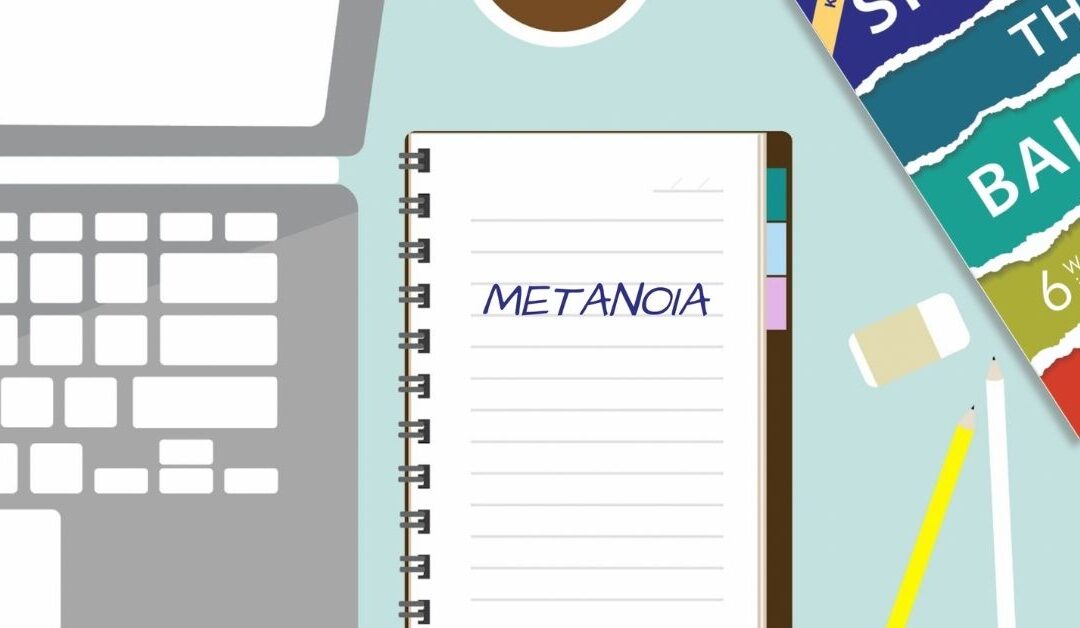We didn’t know this word a few weeks ago. But since we first became aware of it, we seem to be noticing it more and more.
Maybe it’s because we’re immersed in thinking about children’s language development these days.
Maybe it’s because we’re thinking a lot about the power of changing our minds, rethinking previous beliefs and practices.
Maybe it’s because we’re simply lovers of new and interesting words ourselves.
But this week, the word METANOIA has our attention.
METANOIA is a noun that comes from Greek origins and means a transformative change of heart.

We have – each of us – definitely experienced METANOIA with regard to early literacy instruction these past few years. As a reader of this post, we are guessing that you may be experiencing metanoia yourself, grappling with some shifting beliefs around early literacy instruction.
And with your change of heart comes a change of mind, as well. In fact, METANOIA is at the very heart of the work we are all engaged in, and at the heart of what we’ve written about in Shifting the Balance: 6 Ways to Bring the Science of Reading into the Balanced Literacy Classroom.
We’ve experienced METANOIA, for instance, when we realized. . .
-
- It’s been a mistake to trade out precious content area instruction in order to claim more literacy instruction. Children will pay a steep comprehension price for this trade-off down the road. We can shift our practices to include more intentional knowledge building and vocabulary instruction. (We share more about this change of mind and heart in Shift 1, “Rethinking How Reading Comprehension Begins”).
- We’ve overlooked and under-appreciated the importance of really intentional and consistent phonemic awareness instruction for ALL children, from the beginning. Knowing that inadequate phonemic awareness is the most common cause of reading failure is a compelling reason to shift to more intentional and informed phonemic awareness instruction. (We write about this change of mind and heart in Shift 2, “Recommitting to Phonemic Awareness Instruction”).
- In most cases our phonics instruction hasn’t been as explicit, systematic, or cumulative as many children have needed it to be. Too many of them have slipped through the cracks with gaps in their understanding of the code that trip them up and hold them back. We can commit to what Wiley Blevins calls “a mastery approach” with better assessment and more intentional differentiation in phonics instruction. (This is the focus of Shift 3, “Reimagining the Way We Teach Phonics”).
- For too long we’ve been going about high frequency word instruction in ways that are counterproductive and inefficient. There is a secret sauce for word learning called orthographic mapping, and once we understand the recipe for that secret sauce, we can make word learning stick. (This is the focus of Shift 4, “Revising High-Frequency Word Instruction”).
- As painful as it is to realize, and as hard as we’ve tried to offer young readers more options for “figuring out words”, some of the ways we’ve been prompting readers as we sit beside them have led them to develop inefficient habits that actually make reading harder. When we prompt students to sound words out first, rather than looking at pictures or defaulting to context, we equip them to succeed as texts get increasingly complex. (We dig into this in Shift 5, “Reinventing the Ways We Use MSV”).
- Maybe those little leveled books we’ve been so fond of through the years aren’t as good for kids as we’d hoped they were, especially in light of Shift 5. In fact, many of them – and most at the emergent levels – are loaded with problems. Children need texts that align with and reinforce what they are learning in their phonics lessons, so that when we prompt them to sound out words, they are successful. (Shift 6, “Reconsidering Texts for Beginning Readers”)
Perhaps, you are wrestling with some of these same changes. And although announcing a change of heart to those around you can be vulnerable work indeed, it can be profoundly satisfying to step into new ways of thinking, especially those that can help you meet your professional goal of making learning to read easier – not harder – to the children you serve.
Perhaps you are just getting started, but are ready to embrace a transformative change of heart?
Whether you are already shifting or just starting to feel an internal nudge to rethink some things, we are grateful for the opportunity to support you on this journey of exploration, revision, and professional renewal.
Today is the perfect time to embrace the power of METANOIA.




This is incredible! I LOVE your book. I have read it several times and still find it engaging, validating, affirming and wonderfully informative. I have shared my “metanoia” with my colleagues and they are also wanting to get this book and see what it’s all about. THis is exactly what is missing in teaching reading. I can’t wait to get your new book for grades 3-5 when it comes out.
We’re so glad to hear our work has resonated with you. 😊
I have embraced the change after reading your book Shifting the Balance last summer. I have begun to make changes in my classroom in my high frequency word teaching, started using decodable text, and have shifted my small group phonics work to include more orthographic mapping. I know that have more changes to make but these are the small steps that I have started to take with my students.
That’s it! Choose a starting point and start! Momentum builds one small action followed by another. . .
awesome
Reflecting on Daily Lessons
Student evaluation is important so as to know how to best go forward. Equally important are the “self-evaluations.” It is a tough road but one we must all climb. Was my lesson effective? Did it correlate with the skill or strategy most needed and was my approach one that is backed by the most recent research? If students are still struggling after teaching/reteaching the same skills for several weeks, perhaps I need to make some adjustments or better yet, go back to some of the most current literature. Shifting the Balance gave me the opportunity to view my practices in a different light. I made many changes and embraced the power of “Metanoia.”
For this, I will forever be grateful for my extensive coursework in Shifting the Balance. Your dedication to pinning down best practices in a forever-changing field is truly a gift to many .
Thank you for your kind words. Embracing the power of “metanoia” has made all the difference for us. We are inspired by your reflective stance toward professional practice.